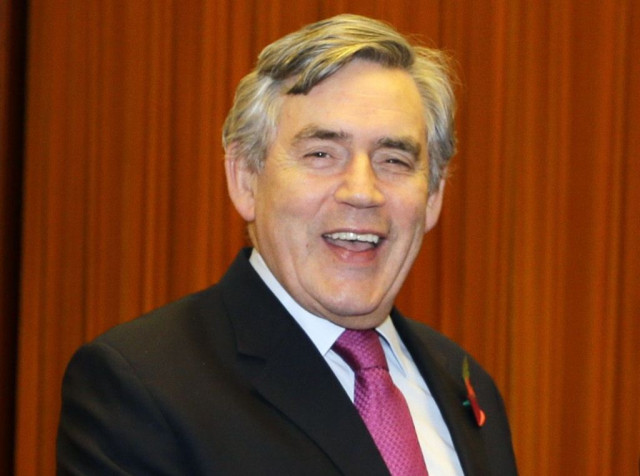New education push: UN envoy promises Pakistan $1b over next four years
Gordon Brown meets Nawaz to discuss improvements in the access to education in Pakistan.

Gordon Brown meets Nawaz to discuss improvements in the access to education in Pakistan. PHOTO: AFP
The international community will provide Pakistan around $1 billion over the next four years to help domestic efforts to deliver universal education in the country, UN Special Envoy on Global Education Gordon Brown announced on Saturday.
Brown, who is on a brief visit to Pakistan, said he met Prime Minister Nawaz Sharif and other top federal and provincial government officials on Saturday to discuss improvements in the accessibility and quality of education in Pakistan, which has the world’s second-most highest number of out-of-school children at the primary school level.
“We want to set a 21-month goal that by December 2015 we have as many students in school in Pakistan as possible,” said Brown, who was flanked by Minister of State for Education, Trainings and Higher Education Baleeghur Rehman and Punjab’s Governor Muhammad Sarwar during a press conference at the Jinnah Convention Centre.
“We will help you as the international community to meet your objective to get every girl and boy in school,” the former British prime minister said.

The education funds, some of which Brown said have already been pledged and some are being pledged, will be provided by different countries and organizations, including the European Union, the United Kingdom, the United Stated Agency for International Development (USAID), Scandinavian countries and Gulf states.
The funding, which is expected to materialise during the tenure of the current government, would be spent on areas such as school buildings, teacher trainings and improving the standard of education through curriculum reform, Brown said. “In return, the world expects Pakistan to continue its efforts to invest in education-for-all and to keep its promise to double the education budget,” he added.
He said the international community also wanted to make sure there were no child marriages in Pakistan, that child labour was outlawed and that Pakistani girls – who wanted to get education – did not face any discrimination.
The UN envoy, who also met with provincial education officials, said he has talked with Pakistani authorities about developing ‘concrete measures to actually get students in school instead of just promising them education’.
He said he has witnessed a greater thrust for education among the government officials and civil society. “I see a consensus right across society that investment in education is a far greater priority in Pakistan now than it was a few years ago,” he said.
The PM’s address
Inaugurating the international conference on `Unfinished Agenda in Education: the Way Forward’, Premier Nawaz unveiled his government’s plan to launch a countrywide literacy movement to ensure enrollment of every child in the school, by introducing a package of incentives.
“Our effort is to achieve the targets, set by Education for All (EFA) and Millennium Development Goals (MDGs) within the coming three years,” he said, adding that a key target, set by UNESCO, was to increase resources for the education sector to reach 4% of the GDP by the year 2018.
The premier said his government’s objective was to develop an educational system that was compatible with the requirements of a knowledge-based economy. He stressed to focus on science and technology and modern skills in education system, besides calling for prioritisation of female education in education policy, effective participation of women in the decision-making process and to protect their respect and dignity.
“It has, in fact, become a national emergency. More than half of the country’s population is below 25 years of age. With proper education and training, this huge reservoir of human capital can offer us an edge in the race for growth and prosperity in the age of globalisation,” he added.
Published in The Express Tribune, March 30th, 2014.



















COMMENTS
Comments are moderated and generally will be posted if they are on-topic and not abusive.
For more information, please see our Comments FAQ